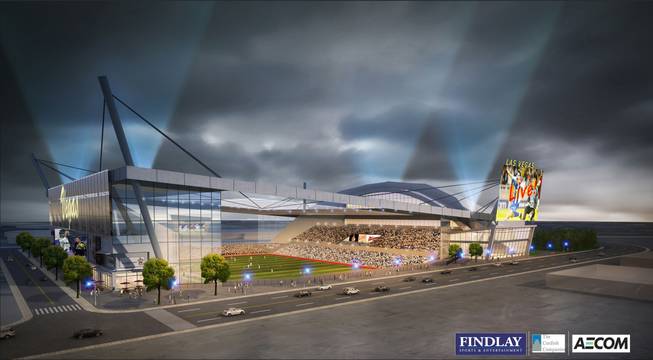
Courtesy
An artist’s rendering shows a proposed design for a future Major League Soccer stadium to be located in Symphony Park near the Smith Center. The proposal was announced Wednesday, May 14, 2014, by Findlay Sports and Cordish Companies.
Thursday, Feb. 12, 2015 | 2 a.m.
Despite continued setbacks, plans to build a $200 million soccer stadium in downtown Las Vegas are still in play and face a critical vote next week.
The project’s path has been rocky, with intense scrutiny over $56.5 million worth of public funding that would be put toward construction. The Las Vegas City Council nearly killed the proposal last fall before a restructuring of the financial plan persuaded Councilman Bob Coffin to change his vote, giving the project a 4-3 margin needed for approval in December and a boost of momentum heading into the new year.
But much of the optimism has evaporated after stadium opponents successfully qualified a ballot initiative that will let voters decide the fate of the project in the June election.
On Wednesday, the city council will decide whether it wants to continue a legal challenge to keep the stadium initiative off the ballot. The group will also vote on a master development agreement that lays down rules for the construction and operation of the stadium.
Ahead of the vote, here's a look at where the stadium stands and what's coming in the months ahead:
On the ballot, for now
A ruling last week by a Clark County district judge means Las Vegas voters will get to decide whether they want city dollars to be put toward the construction of the stadium at the ballot box in June.
Petitioners gathered 6,966 signatures to put the issue on the ballot, but the city said that fell short of the required number of signatures, roughly 8,000. The decision prompted a lawsuit by stadium opponents, led by council members Bob Beers, Lois Tarkanian and Stavros Anthony. District Judge Jerry Wiese sided with the stadium opponents, ruling that the city miscalculated and that only 2,000 signatures were needed.
The city council could decide to challenge the wording of the initiative in an attempt to keep it off the ballot, but there doesn't seem to be much appetite to continue the fight.
"It’s done; let’s move on," Mayor Carolyn Goodman said last week.
Barring further legal challenge, the stadium faces a clear path to the ballot. The only question that remains is whether either side will mount a campaign to sway public opinion to support or oppose the stadium.
Key agreement up for approval
Although broad terms of the stadium deal have been known for months — $200 million in total costs, with the city's contribution at $56.5 million plus a 13-acre parcel of land — the finer details hadn't been revealed until this week.
The council will vote on the 77-page master development agreement next Wednesday, which outlines in-depth various responsibilities and obligations for the developers and the city in the stadium's construction and operations.
Under the deal, the stadium would be owned by the private development partnership of Findlay Sports and Entertainment and the Baltimore-based Cordish Cos. The city would maintain ownership of the land, which is valued at $38 million to $48 million, and would lease it out for 99 years at a rate of $1 per year to the developers.
A promise by Cordish Cos. to invest an additional $250 million to develop land around the stadium, a key deal-sweetener, also was included in the agreement. But the agreement says the company "shall endeavor" to make the investment and doesn't require it as part of the stadium deal.
The development agreement has the support needed to pass the council by the same 4-3 margin that voted in favor of the project in December. But the hearing will give stadium opponents another opportunity to point out perceived flaws.
"Two months, especially with the Christmas holiday, is a very short time to thoroughly vet a contract like this," said Beers, a staunch stadium opponent. "I think we should proceed very slowly and very deliberately."
Parking problems
A key part of the stadium plan calls for the city to build a 1,200-space parking garage at Symphony Park to support game-day operations. The city has pitched the $20 million garage as a needed addition to benefit all of the businesses in the area, not just the stadium, and is seeking to create a Tourism Improvement District to fund its construction.
The district would allow the city to divert new sales tax revenues in the area to pay for the garage.
But the tourism district proposal still needs approval from the Nevada Tourism Commission at its March meeting. The proposal has already drawn criticism from Clark County commissioners, who argue they would lose out on $1.5 million in sales tax revenue if the tourism district is created.
If the tourism commission blocks the creation of the district, it could blow a sizeable hole in the stadium's funding plan.
Will any of it matter?
Several contingencies, from the ballot initiative to the parking garage funds, could derail the stadium project. But the arbiter of soccer's fate in Las Vegas is Major League Soccer, which will decide whether to grant the city the last remaining expansion franchise. Without a team, no stadium will be built.
Las Vegas was already considered an underdog against Sacramento and Minneapolis, the other two finalists for the expansion team. Both cities already have minor league soccer clubs and larger media markets to bolster their appeal. They also aren’t experiencing the political controversy that has dogged Las Vegas' bid.
The MLS is expected to make its decision sometime this spring, and some city officials think the league will be reluctant to choose Las Vegas without a guarantee of a stadium.

Join the Discussion:
Check this out for a full explanation of our conversion to the LiveFyre commenting system and instructions on how to sign up for an account.
Full comments policy